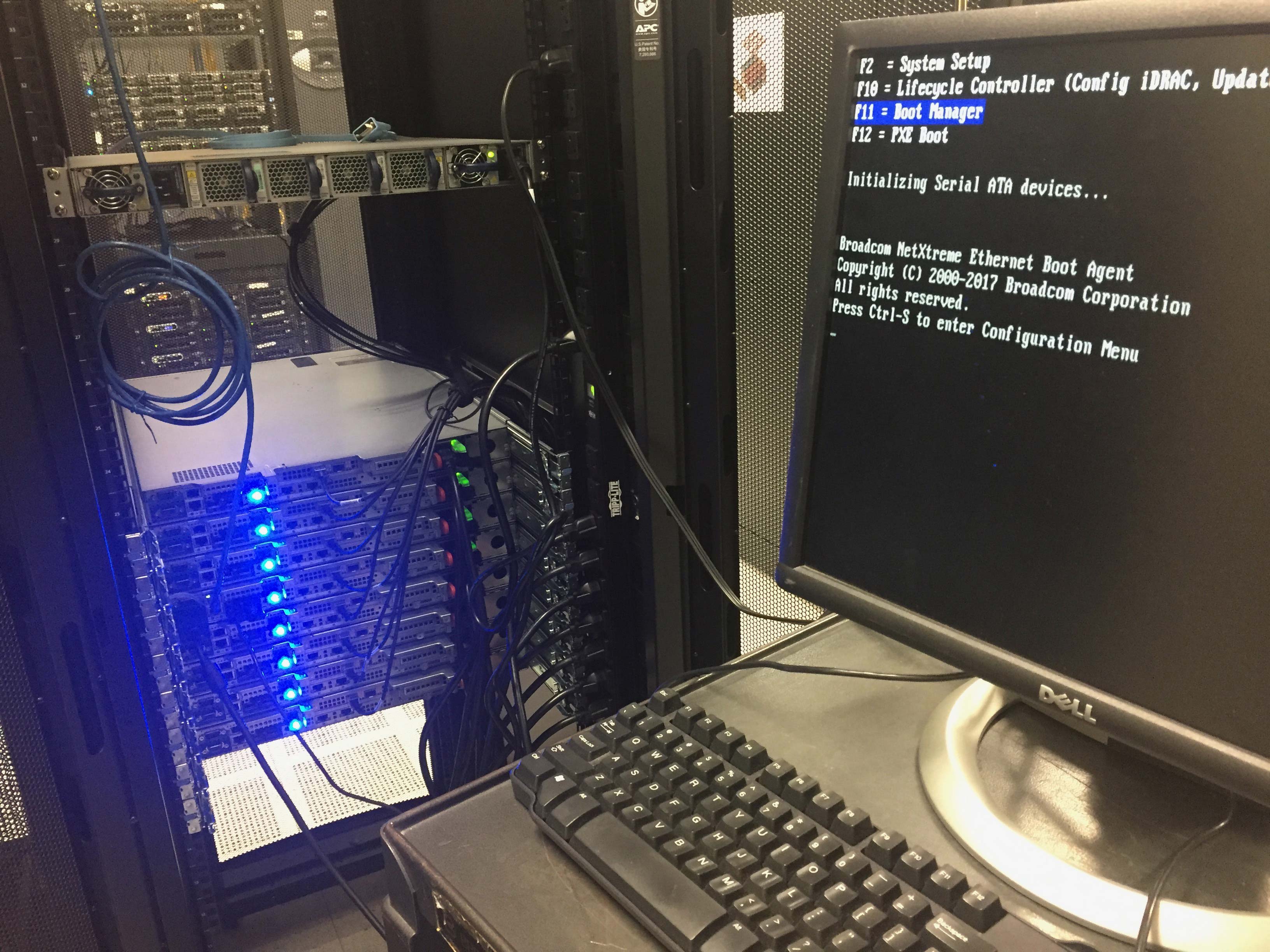-
Mar 2025
TrainCheck is accepted to appear at OSDI '25
[...]
Training deep learning (DL) models is a complex task involving multiple steps and various libraries, making DL training pipelines prone to silent bugs that lead to suboptimal or incorrect models. These issues are challenging to detect and diagnose. TrainCheck is the first framework that takes a proactive checking approach to systematically address silent issues. TrainCheck automatically infers invariants tailored for DL training. It uses these invariants to enhance a training task and proactively detect silent issues while providing debugging help. - May 2024 Yigong will join Boston University as an Assistant Professor!
- Dec 2023 Tony received the honorable mention CRA Outstanding Undergraduate Researcher Award!
-
Dec 2023
Legolas is accepted to appear at NSDI '24
[...]
Partial failures are notorious in distributed systems. Such failures are often only triggered by subtle faults at rare timing, which makes it challenging to expose the bugs during testing. Legolas is a fault injection testing framework that is capable of simulate fine-grained faults in a system using instrumentation. It automatically infers abstract states from a system and leverages the states to efficiently explore the fault injection space. This is another piece of work on our research agenda of dealing with complex failures in distributed systems. - Oct 2023 Chang's PhD thesis received the honorable mention for the Dennis Ritchie doctoral dissertation award!
- Aug 2023Welcome new PhD students Wanning, Yi, and Yuxuan!
-
July 2023
pBox is accepted to appear at SOSP '23
[...]
Modern applications are highly concurrent with a diverse mix of activities. One noisy activity can negatively impact other activities and cause performance interference inside an application. pBox allows developers to systematically achieve strong performance isolation within an application. This work is the final piece in Yigong's PhD thesis research. - July 2023Welcome Ruiming Lu, a PhD student from STJU who will be visiting our lab.
- June 2023Welcome 10 summer interns to our lab: Yunchi, Xiaoyang, Zeyin, Zhewen, Shuangyu, Angting, Yujin, Yicheng, Yuqi, and Dimas! This will be a fun summer.
- Jun 2023Yigong passed his PhD defense, making him PhD #2 from the lab. He will join University of Washington as a postdoc. Congrats, Dr. Hu! Looking forward to the next research chapter that you will continue!
[...]
Yigong's PhD dissertation is titled "Reasoning About and Mitigating Performance Issues in Large-Scale Systems". It covers three major pieces of work Yigong did in his PhD to address performance issues in modern applications. It develops a symbolic execution method to systematically reason about the performance effects of configuration parameters and detect misconfiguration-induced performance issues offline (Violet [OSDI '20]). It designs an operating system-level abstraction along with a runtime library that allow developers to achieve fine-grained performance isolation within their applications (pBox [SOSP '23]). It adapts the lease mechanism in distributed systems and re- purposes lease to mitigate energy-misbehavior in mobile systems (LeaseOS [ASPLOS '19]). - May 2023Chang passed his PhD defense, making him PhD #1 from the lab. He will join University of Virginia as an Assistant Professor. Congrats, Dr. Lou! Best wishes with your new faculty role and research group!
[...]
Chang's PhD dissertation is titled Enhancing Cloud System Runtime to Address Complex Failures. It particularly addresses three classes of complex failures: partial failures (OmegaGen [NSDI '20]), silent semantic violations (OathKeeper [OSDI '22]), and slow failures in the form of memory leaks (RESIN [OSDI '22]). It carefully uses program analysis, instrumentation, dynamic tracing, and statistical analysis techniques to design novel, principled solutions for enhancing the runtime of cloud systems, in the form of watchdog checkers, semantic rules, and monitors and tracers. These runtime components enable a cloud system to detect complex failures quickly and reliably. - Jan 2023vProf is accepted to appear at EuroSys '23
[...]
Traditional profilers are ineffective to debug subtle performance issues when the most costly operations are not the root cause. vProf introduces a new profiling methodology that continuously captures the program variable values besides the costs to enable more accurate performance reasoning. This is a collaboration work with Lingmei, Jason and Junfeng, and a follow-up on our previous collaboration work Argus [ATC '21]. - Sep 2022Ryan gave a talk at Strange Loop on generating runtime checkers for distributed systems.
[...]
The talk summarizes the progress and results from several years' research in the lab on this topic, including Panorama [OSDI '18], OmegaGen [NSDI '20], and OathKeeper [OSDI '22]. - Sep 2022Ryan will join University of Michigan CSE as a tenured associate prof in 2023. OrderLab will move to U-M!
- July 2022Yuzhuo presented Orbit at OSDI '22! First in-person conference attendance since the pandemic!
- July 2022Chang presented Oathkeeper and RESIN back-to-back at OSDI '22! First in-person conference attendance since the pandemic! In fact, Chang also presented in the last in-person conference (NSDI '20) before the pandemic..
- May 2022Our high-school intern Oriane, mentored by Chang, did the final presentation for the WISE program!
- Apr 2022Gongqi will graduate and go to Princeton for PhD!
- Mar 2022Orbit is accepted to appear at OSDI '22.
- Mar 2022Oathkeeper is accepted to appear at OSDI '22.
- Mar 2022RESIN is accepted to appear at OSDI '22.
- Dec 2021Received an NSF SMALL grant on distributed systems fault injection. Thanks NSF!
- Aug 2021Received a Facebook Research Award. Thanks Facebook!
- Jul 2021Argus won the best paper award at ATC!
- Apr 2021Argus is accepted to appear at ATC '21.
- Mar 2021Arthas is accepted to appear at EuroSys '21.
- Dec 2020Gongqi received the honorable mention CRA Outstanding Undergraduate Researcher Award!
- Aug 2020Welcome our new PhD student Yuzhuo Jing.
- Aug 2020Violet is accepted to appear at OSDI '20.
- Aug 2020Narya is accepted to appear at OSDI '20.
- Jun 2020Ryan received the NSF CAREER Award!
- Apr 2020Ding will go to NYU for PhD!
- Feb 2020OmegaGen won the best paper award at NSDI!
- Feb 2020Chang presented OmegaGen at NSDI '20.
- Dec 2019Lab website is re-designed. Deeper appreciation now for front-end web development.
- Dec 2019OmegaGen (aka AutoWatchdog) is accepted to appear at NSDI '20. Congrats Chang!
- Aug 2019Welcome our new PhD student Haoze Wu.
- Jul 2019Welcome our undergrad intern, Ding Ding.
- Jun 2019Gandalf is accepted to appear at NSDI '20.
- May 2019Chang gave his first academic presentation at HotOS '19.
- May 2019Received NSF SMALL grant on utilitarian mobile system design.
- Apr 2019LeaseOS won the best paper award at ASPLOS!
- Apr 2019Yigong gave his first academic presentation at ASPLOS '19.
- Mar 2019Watchdog position paper is accepted to appear at HotOS 2019. Congrats Chang!
- Dec 2018URSA is accepted to appear at EuroSys 2019
- Nov 2018LeaseOS is accepted to appear at ASPLOS 2019. Congrats Yigong, Suyi!
- Jul 2018Systems observability paper accepted by OSDI 2018
- Jul 2018Streaming compression paper accepted by ATC 2018
- Mar 2018Awarded NSF CRII grant!
- Jan 2018Lab website is up!
- Dec 2017Group servers arrived and bootstrapped. The force awoken.
- Sep 2017Chang and Yigong get the scholarship to attend SOSP
- Aug 2017Awarded Azure for research grant
- Mar 2017Gray failure paper accepted by HotOS 2017
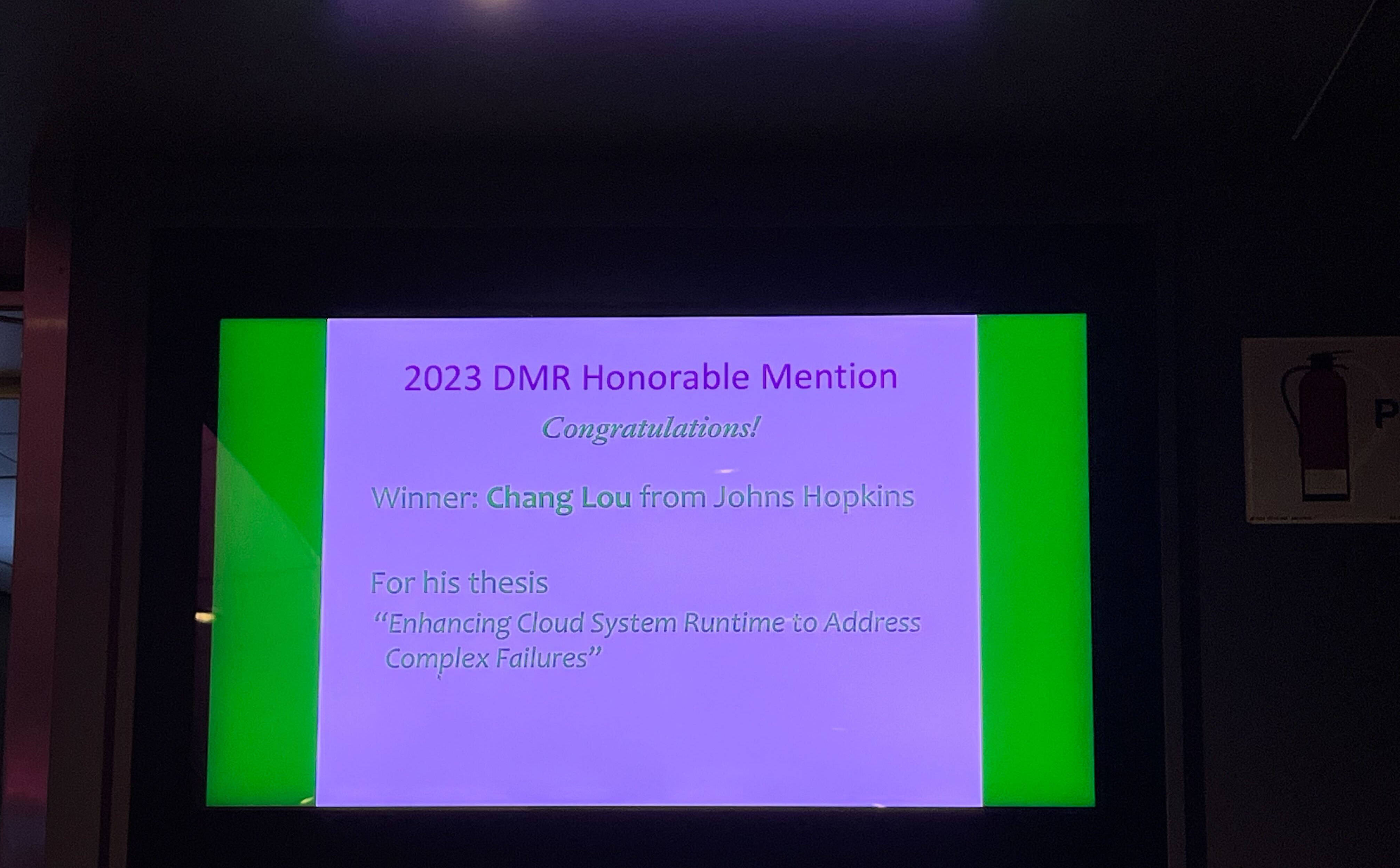
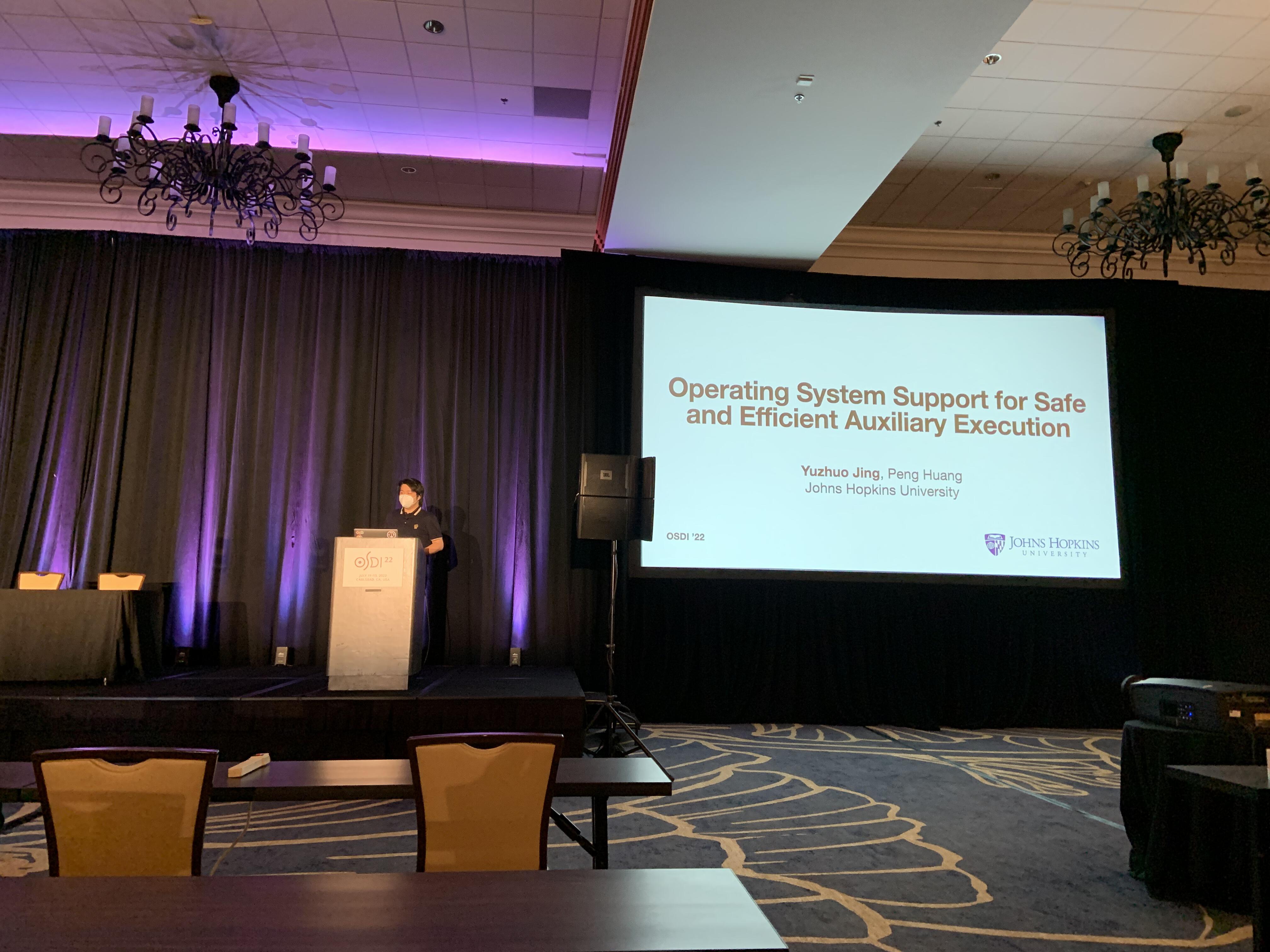
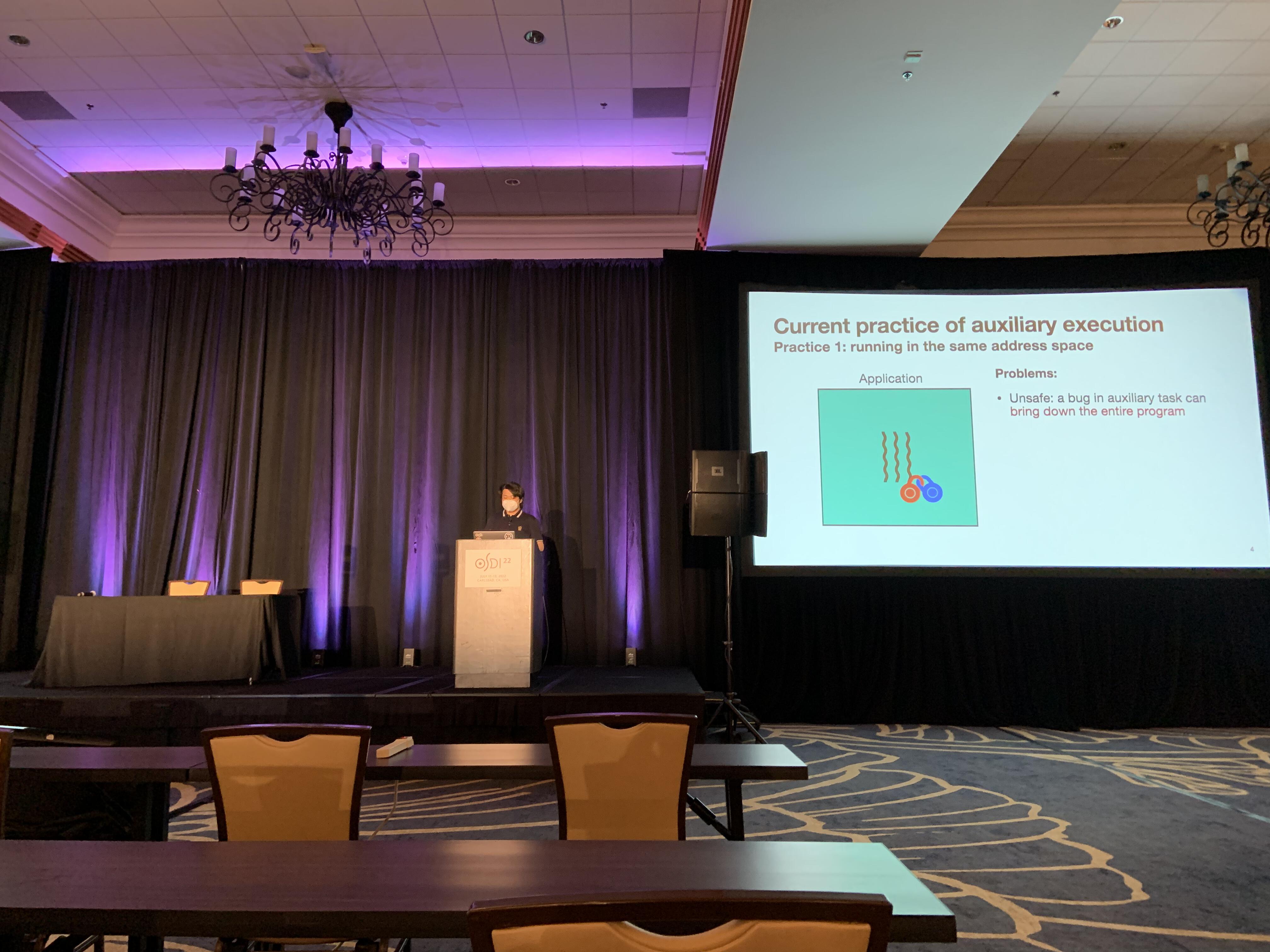
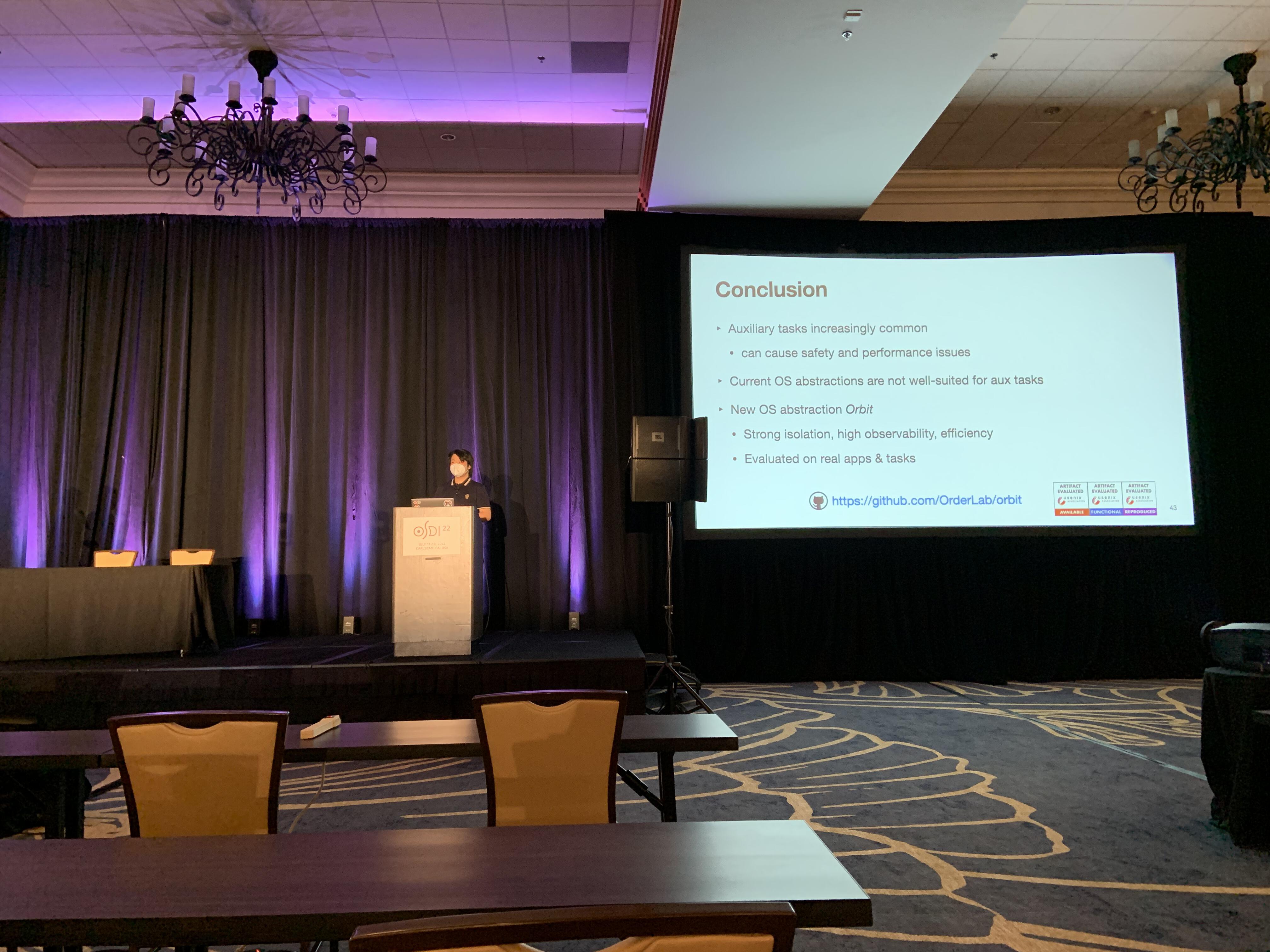
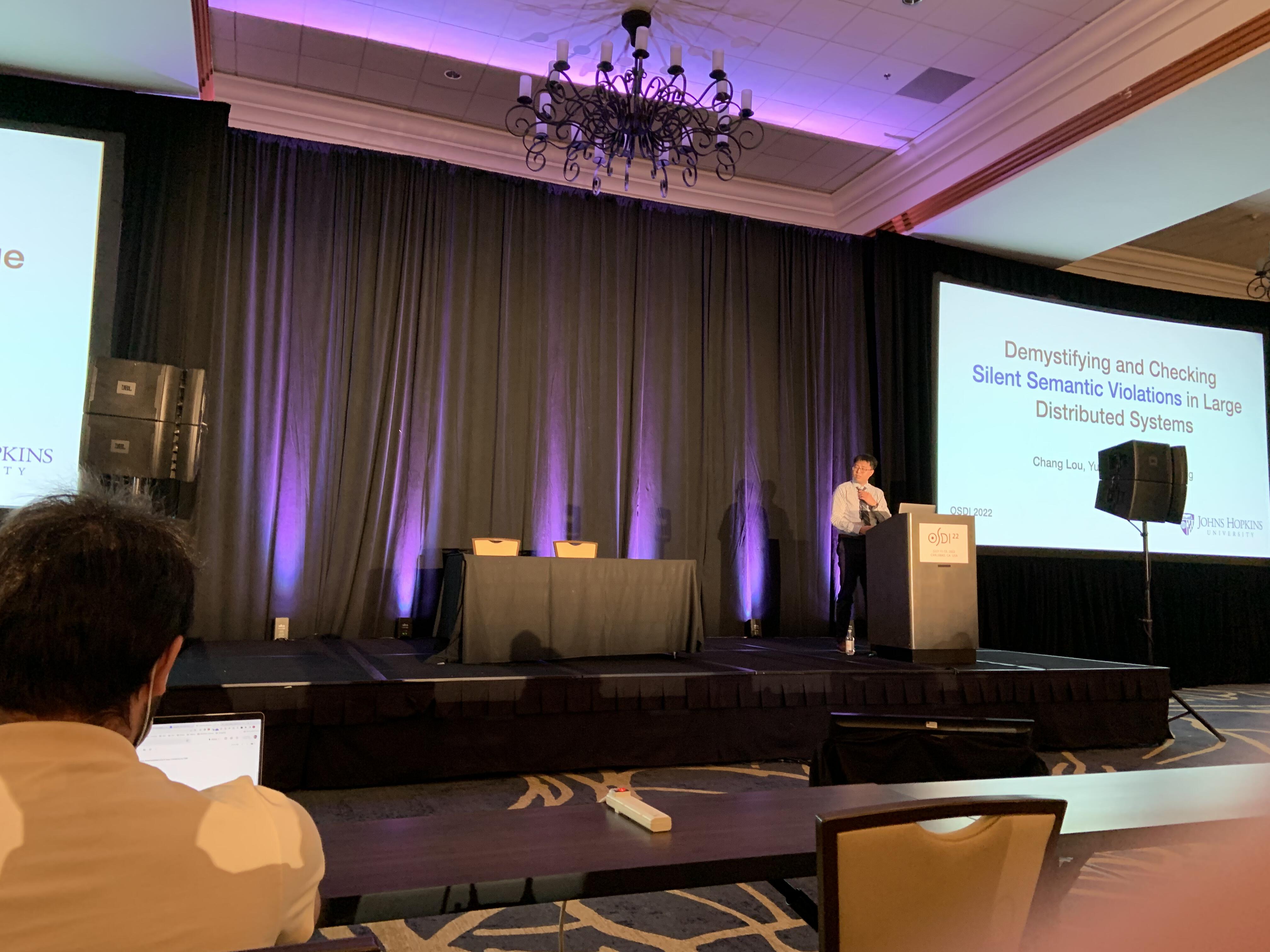
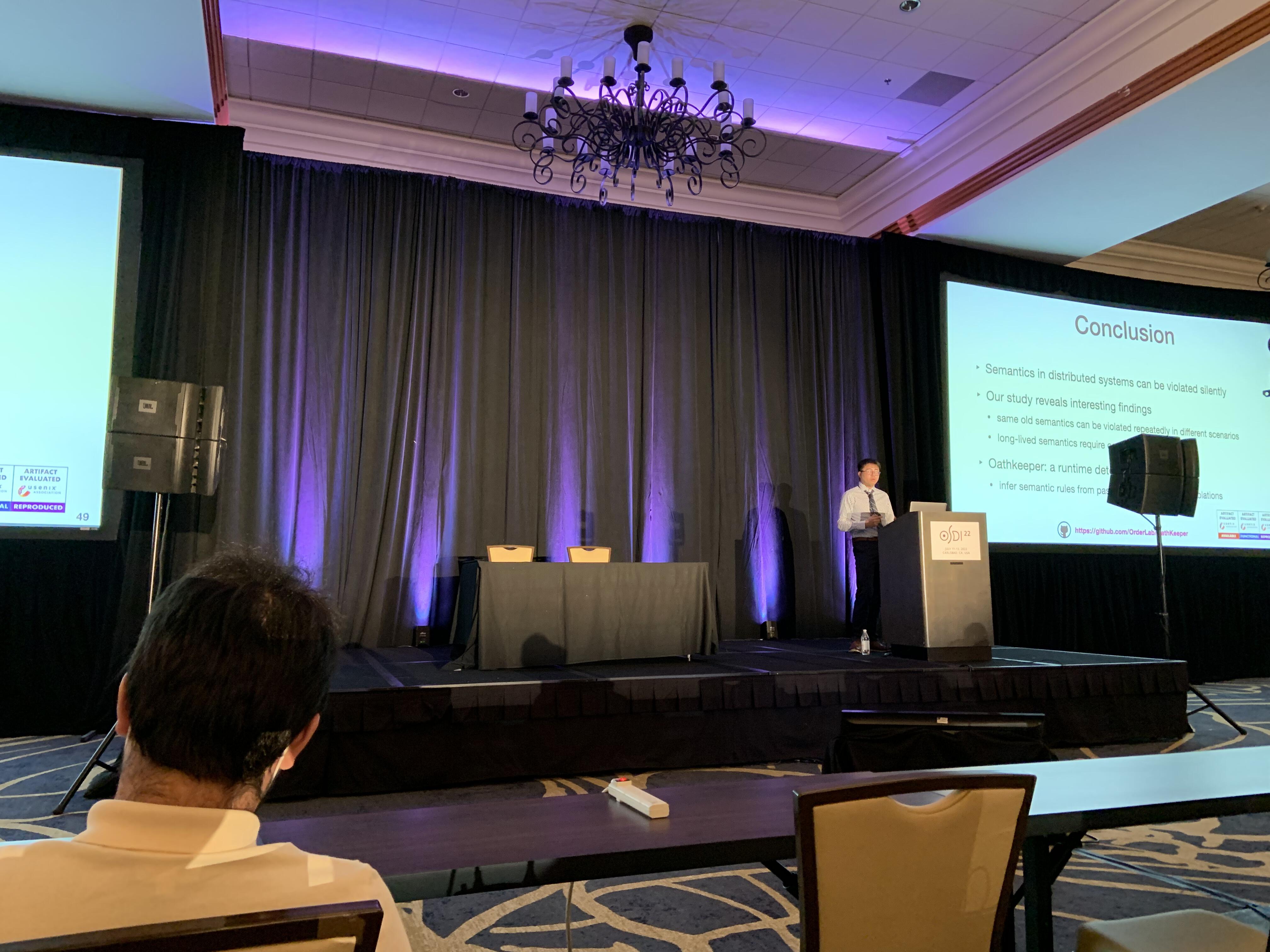
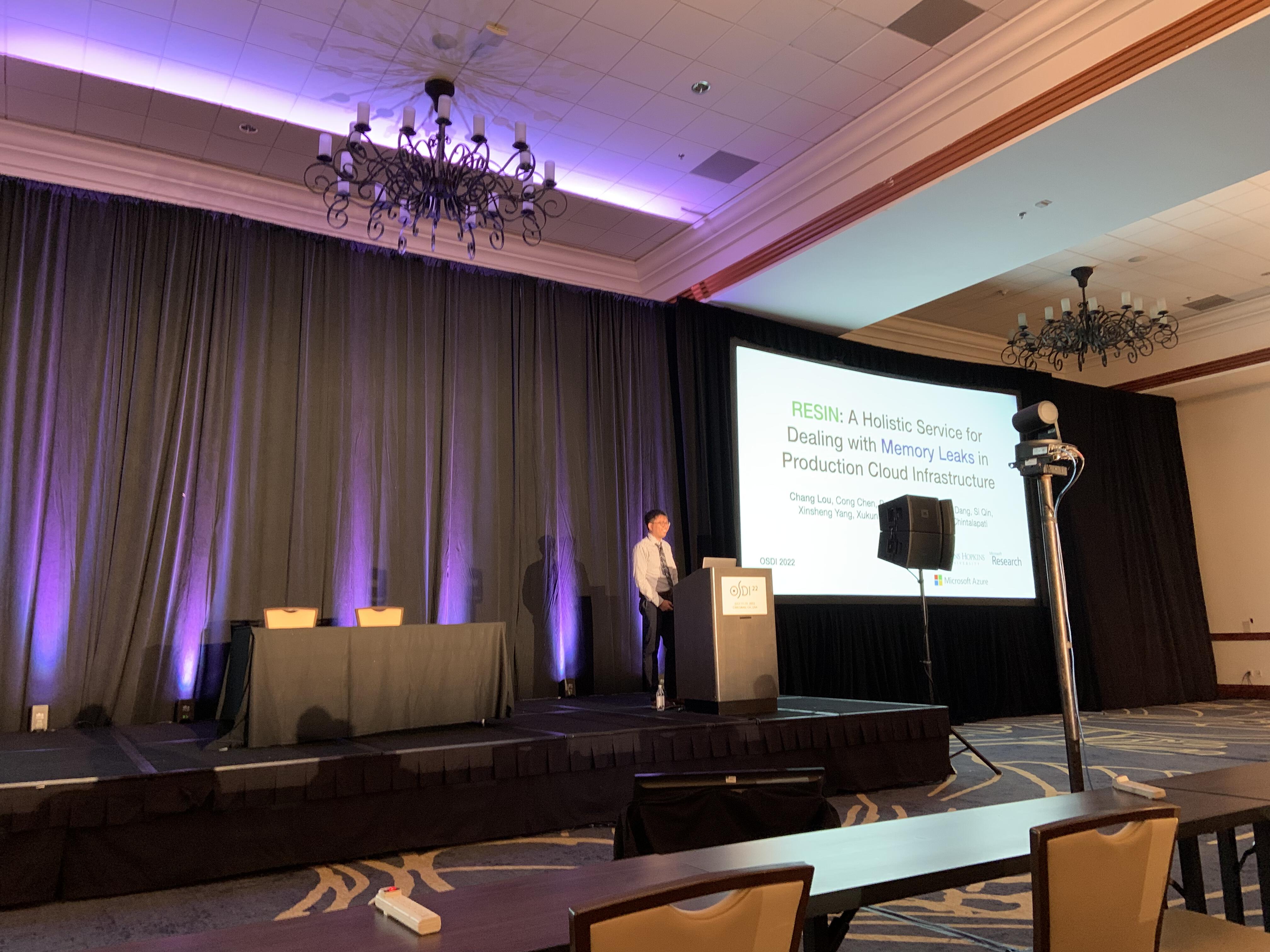
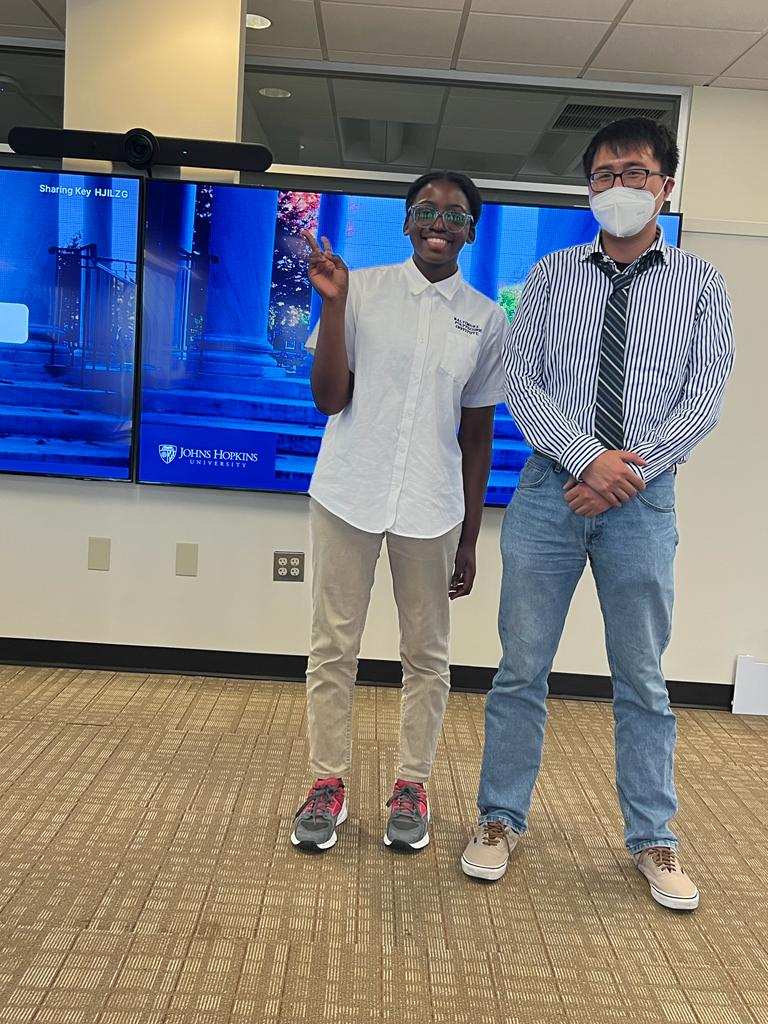
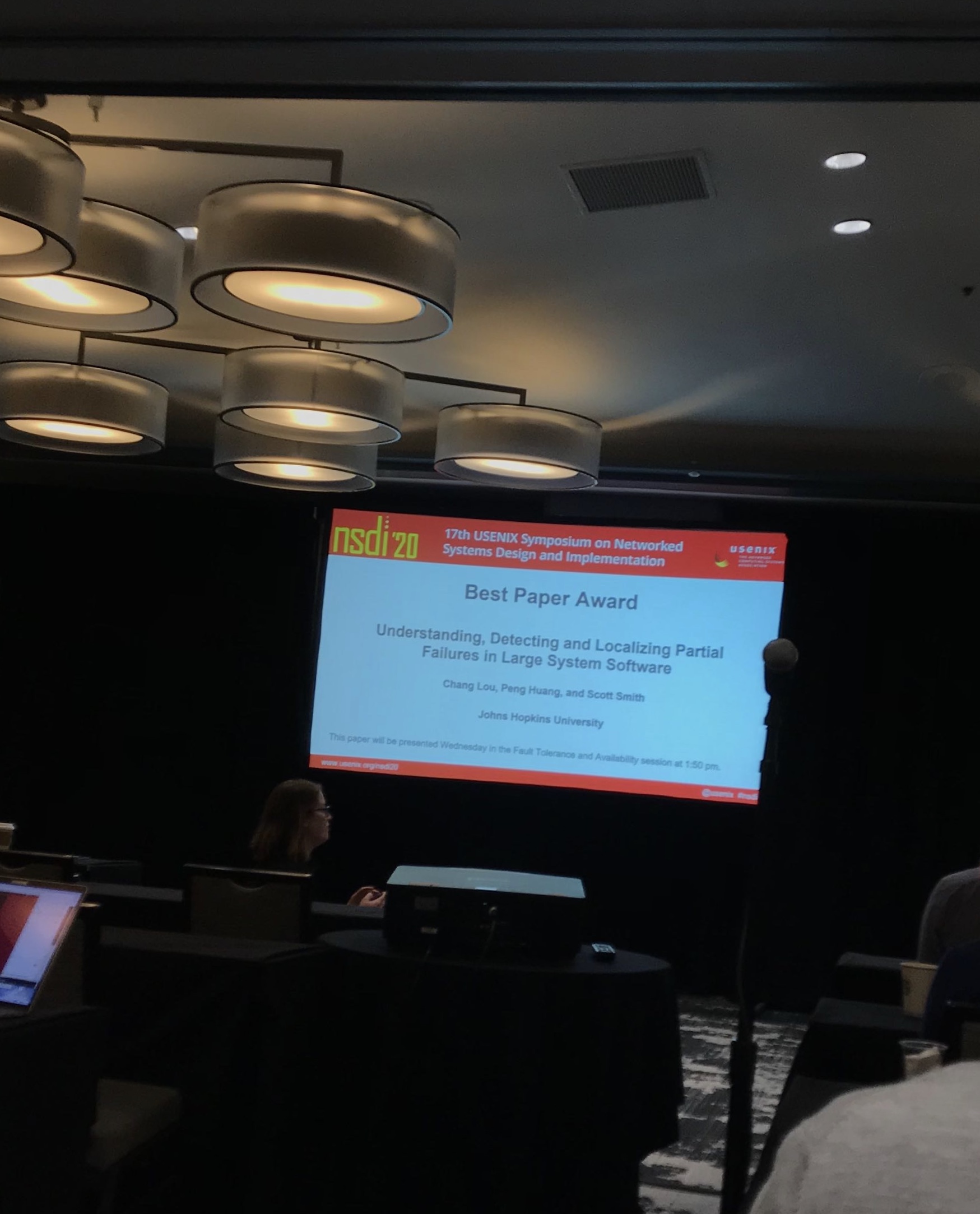
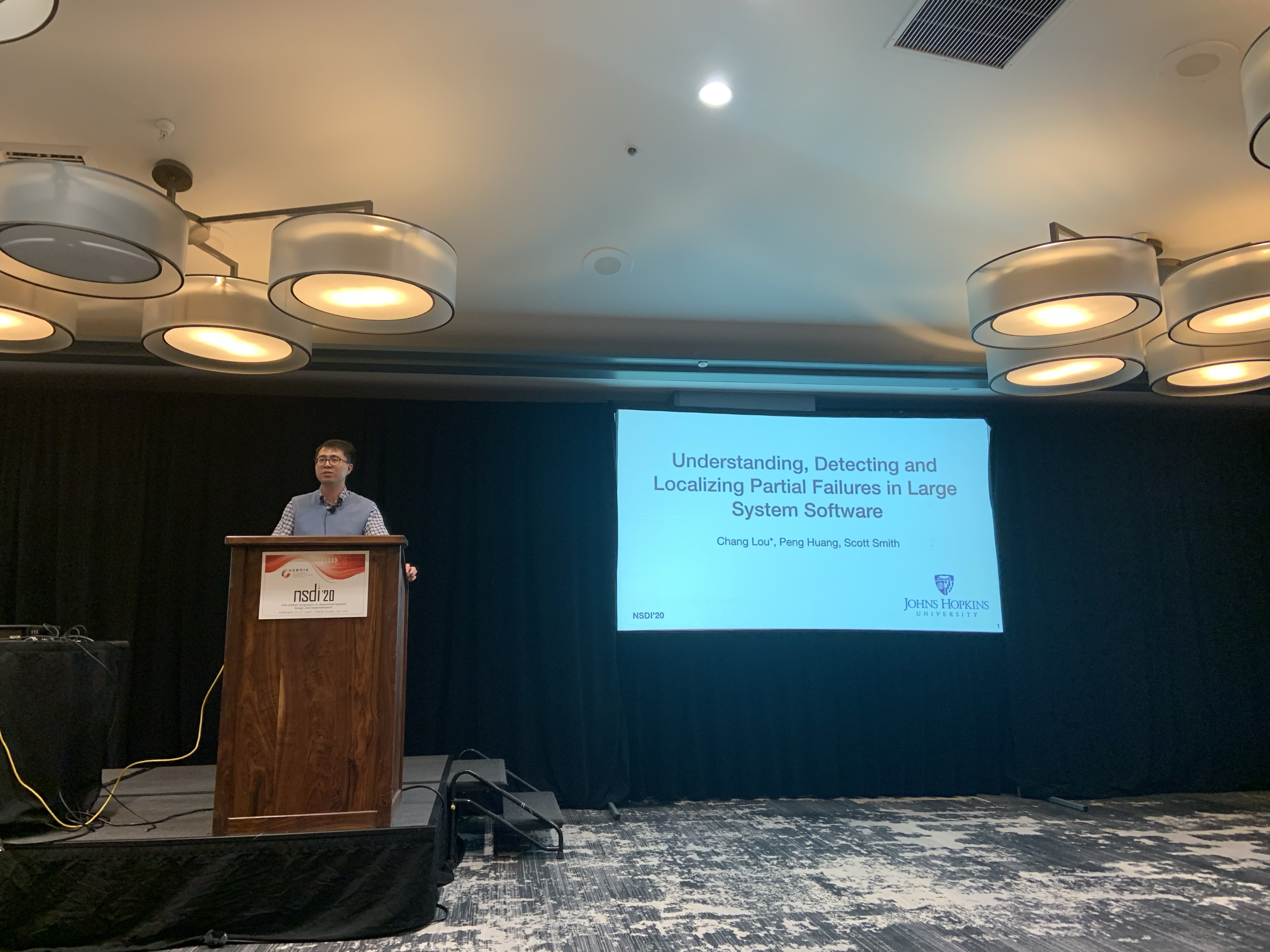

#ProudAdvisorMomement
A photo of Chang giving the talk is missing. I blame the distracting scene of Bertinoro.
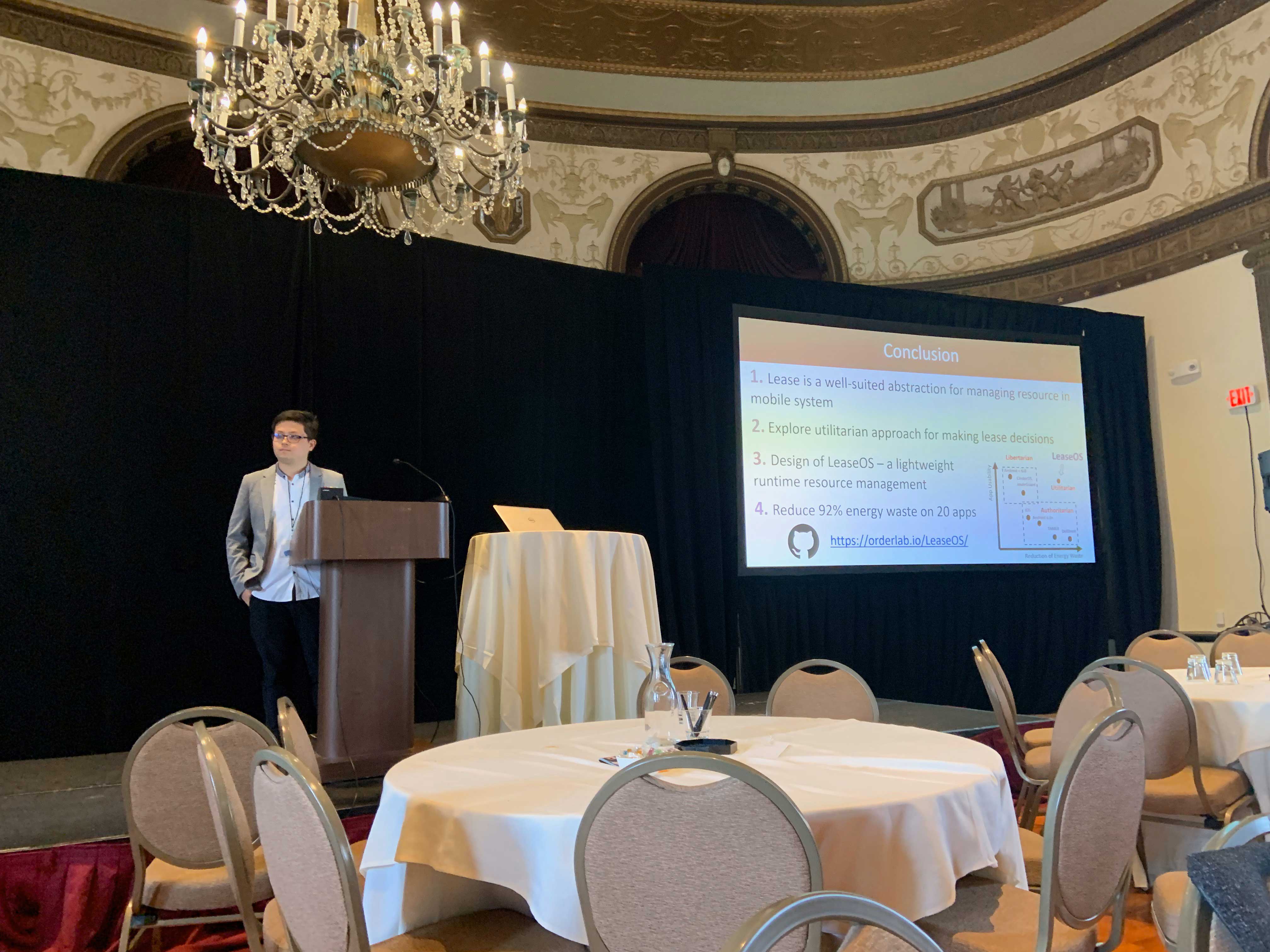
#ProudAdvisorMomement
